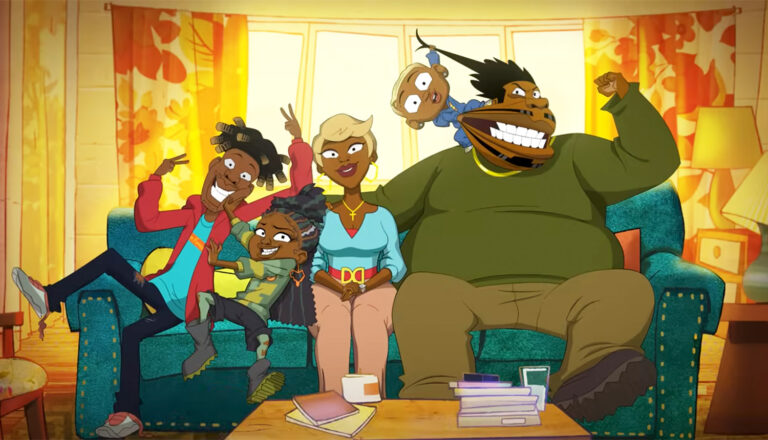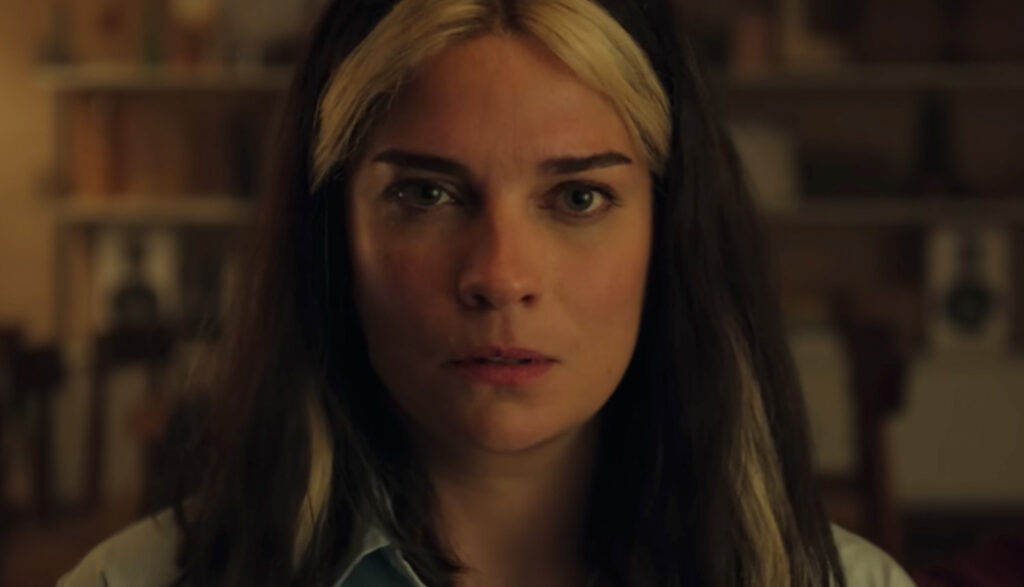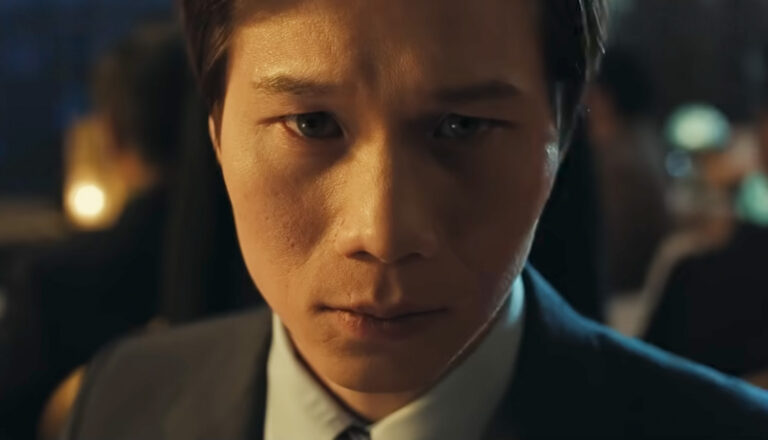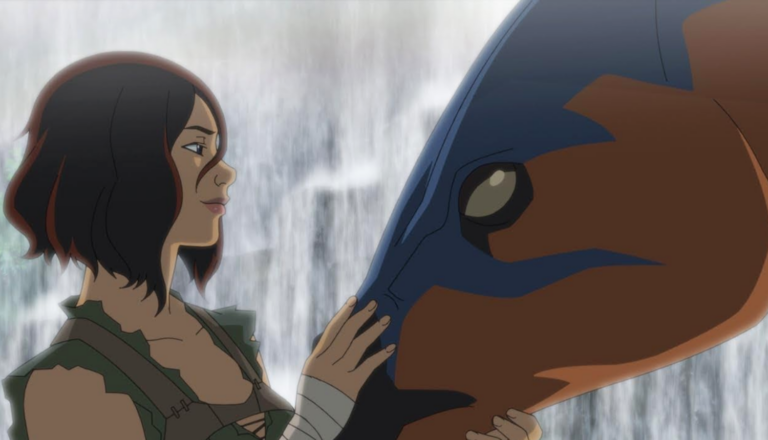
Good Times
Netflix takes a classic sitcom, Good Times, and turns it into a vulgar, violent, sexually-charged TV-MA show.

Scarlett O’Hara told us, “Tomorrow is another day.” Little Orphan Annie told us, “The sun’ll come out tomorrow.” Black Mirror tells us that tomorrow is coming … and it’ll likely bring with it sentient smartphones that will grow opposable thumbs to strangle you as you sleep.
Well, OK, perhaps that’s a bit of an overstatement. This Netflix import doesn’t suggest that your new iPhone is plotting to murder you. Yet.
But this series does caution we may get there if we’re not careful. The wonderful technology we welcome into our homes and lives doesn’t come alone, it tells us: Our cherished devices bring along problematic company as well.
Black Mirror, which began in Britain in 2011 and came to Netflix in 2015, is essentially a modern, tech-obsessed rendition of The Twilight Zone. Just as Rod Serling sometimes used his classic sci-fi series to explore some of the most pressing issues of the 1960s, Mirror wants to hold up a, well, mirror, to our own tech-preoccupied society and show us a warped view of where it might all lead.
The results are rarely pretty.
One episode might feature a future in which most of humanity mindlessly peddles stationary bikes to generate power, their only hope of a better life laying in becoming a reality television star. Another gives us a scenario where convicted killers star in their own reality television shows: Their memories are wiped clean and they’re pursued by “killers” themselves. Still another posits a world in which we all have tiny implants installed in our brains that can replay our favorite memories. A couple is shown having passionless sex as their minds are engaged in memories of spicier, earlier trysts.
“If technology is a drug—and it does feel like a drug—then what, precisely, are the side effects?” Charlie Brooker, one of the show’s creators, told The Guardian. “This area—between delight and discomfort—is where Black Mirror … is set. The ‘black mirror’ of the title is the one you’ll find on every wall, on every desk, in the palm of every hand: the cold, shiny screen of a TV, a monitor, a smartphone.”
As was the case with The Twilight Zone, it’s all done with a constantly rotating cast. The show’s reputation is such that big-name actors sometimes appear. (Jon Hamm, for instance, appeared on a Black Mirror holiday special). But for the most part, the actors are fairly anonymous. And perhaps that’s by design: so much easier for viewers to slip into the story.
On one level, Black Mirror sounds like it’d be Plugged In’s favorite show. Both this ministry and the Netflix series, after all, suggest that we should approach entertainment and technology with caution. Black Mirror doesn’t deny tech’s marvelous characteristics or inarguable usefulness, but it does suggest that all this pixelated wonder comes with a cost. It strikes a warning note when it comes to entertainment, too, and how we’re apt to absorb what the culture peddles without thinking about it. In a way, it’s effectively and boldly preaching a message of discernment.
But while Black Mirror upbraids our culture for not thinking critically, it also turns away from its own content concerns—of which, alas, there are many.
The show can be seductively, uncomfortably sexual, both in its themes and its presentation. Storylines have featured everything from pornography to bestiality. While it seems to avoid outright R-rated nudity, it gets as close as it can at times. And though Black Mirror doesn’t rely on gratuitous violence to draw viewers—again, think of the old, cerebral Twilight Zone—when the script calls for blood, the camera doesn’t shirk from its flow. Perhaps the biggest content issue, however, is not so much what we see, but what we hear. Language can be outrageously foul: A recent episode included nearly 40 f-words in a 75-minute show.
And Black Mirror doesn’t just take its cue from the dark screens all around us today: It also feels like a nod to scrying, the ancient occultic practice of looking into some sort of reflective surface—often a dark one—to see into the future. Netflix’s show taps into the same appeal that scrying might’ve had centuries ago; the dark desire to peak into tomorrow. But the visions Black Mirror gives us can be black indeed, both in their stories and the content they come with.
Yes, this Netflix anthology can show us uncomfortable, worthwhile truths. But at what cost?
Joan is an average woman with a fiancé and a corporate job. She’s not that unusual, and certainly not particularly better or worse than most of the folks she knows. Or at least she doesn’t think so until she watches the latest show on Streamberry, “Joan is Awful,” which is about her. Every action in her life has been captured and exaggerated in this new TV show starring Salma Hayek. And Joan wants it gone.
If you’re looking for entertainment that saddles you with an existential crisis, “Joan is Awful” is the episode for you. The show brings up excellent points about the state of entertainment and the strategies companies use to keep you hooked on their screens. However, coming from Netflix–king of endless entertainment and master of data analytics–the message is muddled and comes with plenty of content concerns (some of which undermine the episode’s message).
The biggest concern is language. This episode contains 34 uses of the f-word, six uses of the s-word and 15 misuses of God’s name. Characters also say “crap,” “h—,” “d—k,” “b—ch” and “a—”/“a—hole.” We also see characters smoke, and some characters sit at a bar.
Characters also make plenty of explicit references to sexual acts–both through innuendos and actions. In one scene, a character draws male genitalia on Joan’s face. In another, a character listens to a sexually explicit song while in the car. Joan texts and spends time with her ex-boyfriend, and in a therapy session, Joan explains that she misses the ardent lovemaking with her ex. Characters passionately kiss several times, and we see a couple start to make love (although nothing critical is shown). A few scenes features a same-sex couple watching TV together, referring to one another as “babe.” We also see a character wear a very low-cut top.
“Joan is Awful” doesn’t shrink away from bathroom references either. In one scene, a character watches “Joan is Awful” on the toilet. His pants are down, but nothing critical is seen. In another scene, a character gorges herself with food. Then, the character drives to a wedding and defecates in a church.
Plenty of characters yell at others, and one character gets so angry she throws her phone across the room. A character threatens to break someone’s arm. We also see a character punch someone in the face, knocking him out. [Spoiler Warning] There is also a scene in which two characters break into a facility to destroy a computer server.
Although “Joan is Awful” provides a valuable message about the danger of media obsession, it also has an overarching theme about self-satisfaction and the importance of being the “main character” in your own life. This humanistic idea and the vast array of other content concerns will probably have most families avoiding “Joan is Awful.”
After accidentally summoning a demon with a talisman, Nida has a choice: Murder three people or watch the world burn.
In case the title didn’t make it clear, “Demon 79” contains a lot of problematic spirituality. The episode’s action begins when Nida cuts her finger, spilling her blood onto a mysterious talisman. Gaap, the demon inside, explains that Nida has bound herself to him. Their mission is simple: prevent Armageddon by making three human sacrifices before May Day. Gaap coerces Nida to invite him to enter her body, and when she does, she sees his horrific demonic form. Throughout the episode, we watch Gaap follow Nida, directing her murder mission. Gaap helps Nida choose her victims by showing visions of their immoral actions. Each time Nida sees a vison, her eyes glaze over. Later, Gaap explains that the reason he was able to possess her was because she was “corruptible.” At one point, Gaap explains that if he and Nida fail to make the three sacrifices, he will be sent into “eternal oblivion” where he will cease to exist. By the end of the episode, a human character expresses desire to join him in this “eternal oblivion.”
Perhaps the most disturbing part of the episode’s spirituality is that most of it is approached with levity. Although Gaap’s original form is a monster, he soon shapeshifts to look like Bobby Farrell, the lead singer from Boney M.–and the writer of the song “Rasputin.” The demon cracks dark jokes about murder and cannibalism. At one point, Gaap claims that murderers are playing for the “home team.” Several times, Gaap explains that many people deserve to be murdered, and by the end of the episode, the viewer is prompted to root for Nida’s murder spree.
Speaking of murder, “Demon 79” contains an abundance of violence. Before being possessed, Nida has visions of strangling and beating people, and we hear references to murder and suicide. Once the murdering begins, the episode shows all the gore and blood associated with these very violent deaths. We watch Nida mercilessly bash the heads of various people, spilling blood everywhere. A character stabs someone, and we see the blood-covered knife afterwards. In the aftermath of these murders, the episode often shows the victims’ blood-covered corpses. We also see a character get into a car crash.
The episode contains quite a bit of sexual content as well. One of Nida’s victims is a man who has raped his 8-year-old daughter. Gaap shows Nida a vision right before this horrific act occurs, where the father begins to take off his belt. There is also a scene in which an older man plans to have sex with a younger woman. We see him take his pants off and stand in his briefs (though nothing critical is seen). A character asks if the woman plans to “shag him.” Porn magazines are strewn on a character’s bedroom floor.
In terms of profanity, “Demon 79” is not afraid to use it. There are 16 uses of the f-word, two uses of the s-word and a misuse of God’s name. Characters also use “h—,” “p-ss,” “a–,” “bloody” and “b-llocks.” We also see a character vomit, and a man urinates on a wall (though nothing critical is seen). Several characters smoke, and in one scene Nina goes to a bar and drinks several glasses of alcohol.
What is redeemable about this episode, then? For most families, not much. However, the show provides some commentary on the treatment of immigrants. Nida, an immigrant from India living in Britain, deals with discrimination in her workplace. A coworker complains about her “smelly food,” and her boss later instructs Nida to eat her food in the basement, so she won’t bother others.
In this special interactive episode, viewers meet Stefan, a young, talented, rather unstable videogame designer who lives with his father. Working in a time (1984) when videogames were in their infancy, Stefan’s latest game is based on a Choose Your Own Adventure book by Jerome Davies. Alas, Davies went mad while writing Bandersnatch and cut off his wife’s head. Could Stefan go mad as well? In this Choose Your Own Adventure-style episode, it’s entirely up to you, the viewer!
With a reputed five hours’ worth of possible content available for this 90-minute episode, we can’t unpack every possible ending. But we can say that possible storylines include the murders of multiple people (blood seeps from a horrific head wound of one of the victims); the dismemberment of a corpse (we see the saw at work); a bloodied, disembodied head sitting on a bureau; and a backyard burial. One man leaps to his death: We witness that fall and see the body land with a grotesque splash of blood.
Because of the show’s unusual narrative construct, we may see these deaths multiple times; and sometimes those dead characters return, apparently unharmed. We glimpse crime photos from Davies’ original act of butchery. A person or people die, off-camera, in a train derailment. A rudimentary video game features someone leaping off a balcony: The object seems to be to “collect” balloons on the way down.
Stefan is taking antipsychotic medication: We see him swallow those pills, as well as being prescribed a higher dosage and/or dumping the medication in the trash. Another game designer, Colin Ritman, rolls and smokes his own cigarettes. He and Stefan apparently share a huge marijuana joint. And the consumption of LSD is a huge plot point in, presumably, most of the episode’s storylines as well. People may drink wine, too.
Characters swear liberally in almost every timeline, including some sporadic uses of the f- and s-words. At least one viewer choice (which viewers can select via keyboard, touchscreen or TV remote) contains an f-word. We hear some references to a demonic entity in Davies’ book (and Stefan’s game) called Pax.
Robert Daly leads two lives: In his “real” life he works as the chief technical officer for Infinity, a massive online gaming universe. But off the clock, Daly lives in his own version of that universe—skinned to make it look like Star Fleet, an old Star Trek-like TV show. There, he’s captain of the USS Callister—and he’s populated his ship with sentient clones of people he works with.
While Daly’s real-world workmates have no awareness of their coworker’s virtual identity, those online clones—made from their originators’ actual DNA—know that they’ve essentially been kidnapped by Daly. They’re forced to live out his fantasies, serving as whipping boys (and girls) for his insecurities. They’re also utterly powerless: Daly punishes them by making their faces vanish (rendering them unable to breathe), turning them into gigantic insect monsters or even killing them. Because he still possesses their DNA, he can bring them back and repeat the process anytime he’d like.
For example, Daly procured DNA from the 6-year-old son of one of his workmates, uploaded a clone of the boy into the game and them launched him into space, where the child instantly froze and cracked “like a porcelain doll.” One of Daly’s “crewmembers” says that they all live in a “bubble universe ruled by an a–hole god,” and they all long to die.
Daly kisses his female crewmembers regularly, but he adheres to Star Fleet’s 1960s ethos: “No tongues,” someone’s told. Moreover, none of the crew members have genitalia: One male crewmember drops his drawers to reveal a featureless crotch. Crewmembers describe how they’ve tried to rub their crotches together in hope of sexual stimulus, but to no avail; moreover, they also live without any way of defecating—an act that many deeply miss. (After the universe changes, one crewmember peeks in his drawers and is gratified by what he sees.) One crewmember tries to blackmail her real-world self by threatening to leak sultry pictures she took during a trip to Las Vegas. We see shots of that woman in lingerie (including one where she’s covering an exposed breast with her hand), and we learn that she was in Vegas with another woman. Daly and a crew member strip down to their skivvies to swim in an alien lake.
A man is shot with a laser gun. A woman is turned into a horrific monster, and the transition looks painful. Someone sacrifices himself, painfully, for the benefit of the rest of the crew. A character gets choked and used as an ottoman. A ship blows up.
Characters drink various beverages, presumably alcoholic. One contains vodka, while others may have more exotic, galactic ingredients. Characters swear a lot: We hear more than 35 f-words and nearly 15 s-words, along with “a–,” “b–ch,” “b–tard,” “d–n” and “h—.” God’s name is misused about 15 times, five of those with the word “d–n,” and Jesus’ name is abused twice.



Paul Asay has been part of the Plugged In staff since 2007, watching and reviewing roughly 15 quintillion movies and television shows. He’s written for a number of other publications, too, including Time, The Washington Post and Christianity Today. The author of several books, Paul loves to find spirituality in unexpected places, including popular entertainment, and he loves all things superhero. His vices include James Bond films, Mountain Dew and terrible B-grade movies. He’s married, has two children and a neurotic dog, runs marathons on occasion and hopes to someday own his own tuxedo. Feel free to follow him on Twitter @AsayPaul.

Netflix takes a classic sitcom, Good Times, and turns it into a vulgar, violent, sexually-charged TV-MA show.

While its protagonist might live a nuanced life, The Sympathizer’s problematic content can’t be described the same way.

Say hola once again to the iconic explorer in this faithful reboot of the children’s series.

Based on a popular video game, Ark: The Animated Series features hungry dinosaurs, bloodthirsty people and plenty of problems.